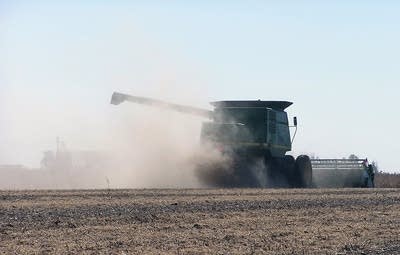Farmers call for spending cuts, can't agree where
Go Deeper.
Create an account or log in to save stories.
Like this?
Thanks for liking this story! We have added it to a list of your favorite stories.

By RAY HENRY, Associated Press
ATLANTA (AP) - The nation's biggest farm lobbying group supports a balanced budget. It's against tax increases and says the federal government needs to tighten its belt.
Just don't ask its members where the government should trim billions of dollars in agriculture spending - they can't agree.
Despite warnings about belt-tightening and record federal deficits, delegates to the American Farm Bureau Federation left their annual convention this week without making major suggestions on where Congress should trim spending in the next Farm Bill, which sets federal funding for agriculture.
Turn Up Your Support
MPR News helps you turn down the noise and build shared understanding. Turn up your support for this public resource and keep trusted journalism accessible to all.
Senior Farm Bureau leaders, a ranking senator and even U.S. Agriculture Secretary Tom Vilsack signaled this week that cutbacks are likely as the aftermath of the Great Recession pushes U.S. government deficits to levels last seen during World War II.
"We have a responsibility, even an obligation, as an organization with great political and policy influence, to weigh in and help find solutions to these problems facing our nation," Farm Bureau President Bob Stallman told the convention in his opening address. He urged his fellow farmers to "make choices and establish priorities."
It didn't happen.
"Our delegates did not give us clear direction as how and when and where that should occur," Stallman conceded two days later, after the farmers punted those decisions back to the Farm Bureau's board of directors.
It remains unclear exactly when cuts could be coming. Lawmakers could trim spending approved in the 2008 Farm Bill this year to align existing spending with the federal government's diminished income. But the austerity debate also could be delayed until Congress starts major work on the next five-year Farm Bill.
"This is going to be the most difficult Farm Bill that we've ever had to write," Sen. Saxby Chambliss of Georgia, the ranking Republican on the Senate agriculture committee, told the convention.
Some farmers signaled a willingness to compromise to save the U.S. money. They suggested individual farmers should pick which safety net program they want from the federal government but not take assistance from multiple programs.
Money saved under that plan could be used to expand agriculture insurance and price protection for all farmers, said Craig Lang, who leads the Iowa Farm Bureau and helped draft the proposal. Farmers with better insurance would be protected from problems that hit their wallets but are beyond their control, such as disease outbreaks and drought.
"It protects the assets so you can come back the next year and keep producing either that meat, milk, eggs or crop, or whatever it is," Lang said.
But the proposal was ripped apart by other delegates, especially Southern farmers. They prefer direct payments from the federal government - one part of the existing safety net - and have complained that insurance premiums are too high for the benefits they receive.
With that opposition, support for the compromise quickly evaporated, and delegates decided to lobby for direct payments, crop insurance and two other programs designed to protect farmers' bottom line.
Wisconsin Farm Bureau President William Bruins, a dairy farmer, worried the lobbying group was asking for too much.
"Let's make sure that each and every program that we support in the Farm Bill is important enough that we want to save some dollars for it," he said. "So let's not simply load the Christmas tree up with ornaments and see how many of those programs we can keep alive."
(Copyright 2011 by The Associated Press. All Rights Reserved.)




